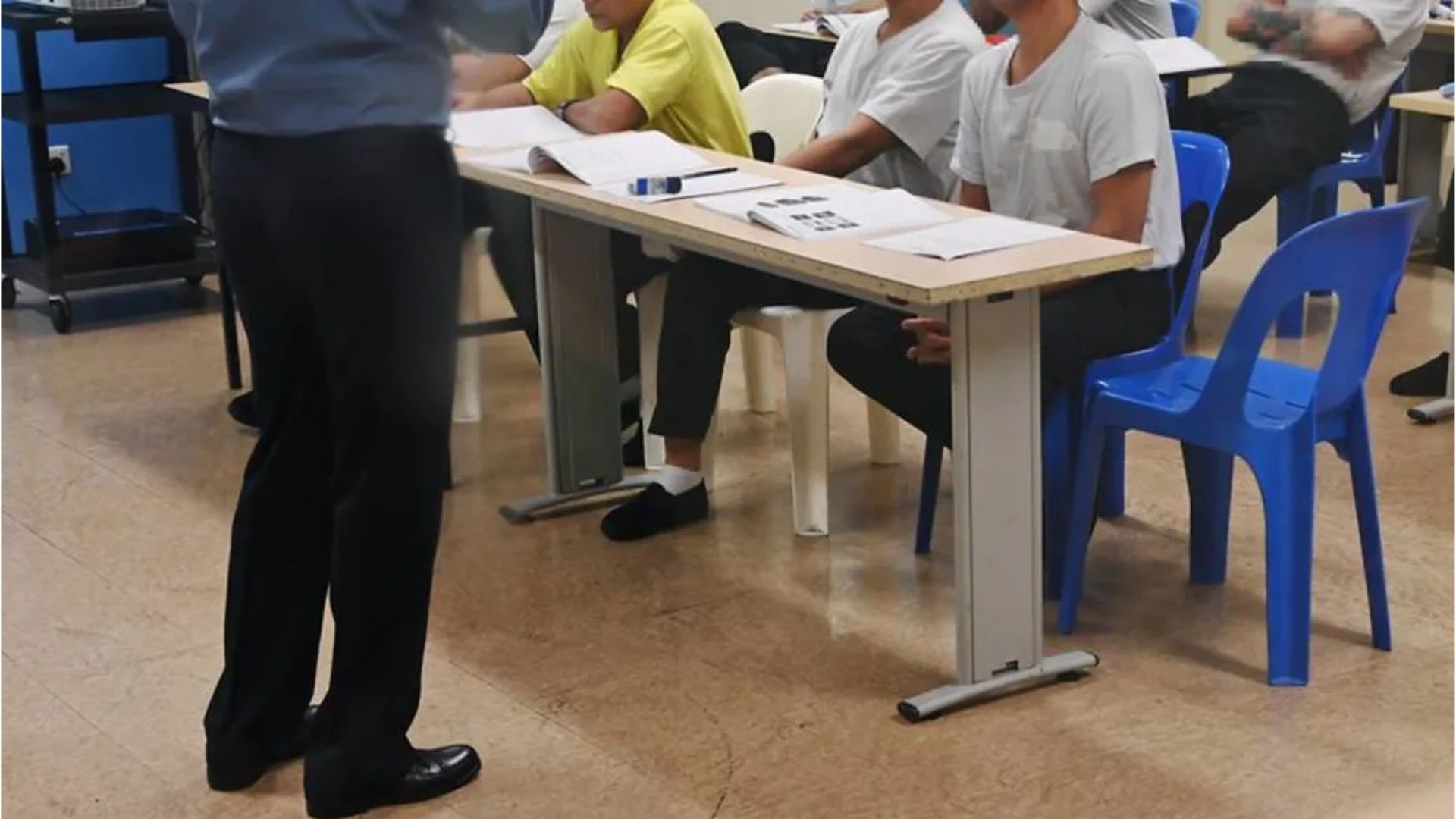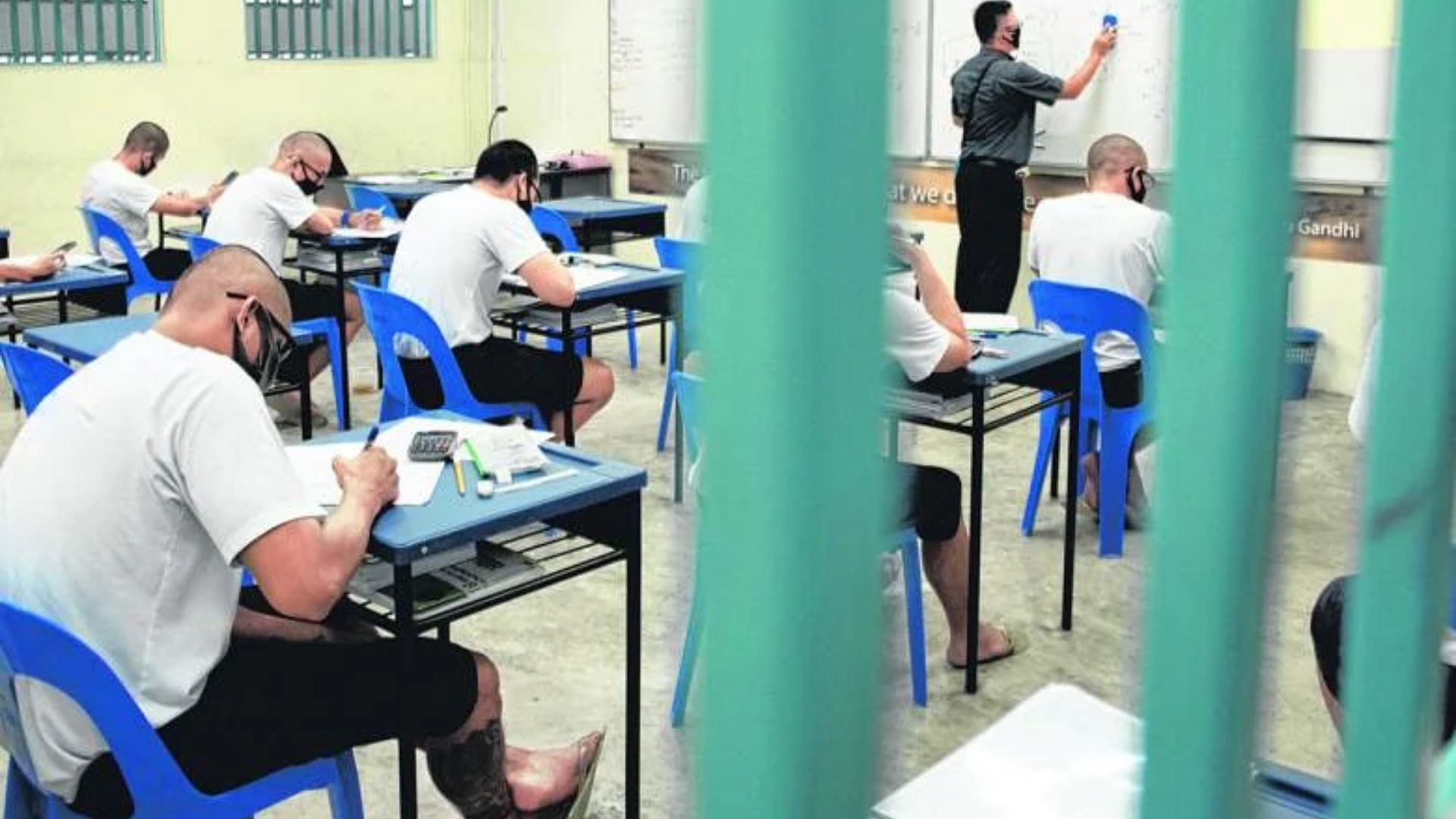Many re-offenders in Singapore who repeatedly break the law and return to prison “time and time again”, are said to come from specialised schools catering to the “PSLE no-hopers”, while some are said to be on the spectrum.
Counsellors and even ex-offenders believe this stems from the sudden loss of structure provided by these schools when the offenders graduate into society and the working world.
This seems to be supported by the 2021 study by Statista, a German company specialising in market and consumer data, which found there were almost 3,000 inmates in jail in Singapore who have secondary school qualifications as their highest education level. This was followed by more than 1,600 with primary education.
Reoffending results in stricter penalties for subsequent convictions and the purpose of imposing harsher penalties is to deter further relapse. Although there are no official statistics on this available, the data from the Singapore Prison Service (SPS) showed the rate of local inmates backsliding within two years of release hovering around 25 per cent for the past ten years.
The good news, however, is that it was at its lowest in 30 years last year (2021). It showed that of the offenders released from SPS custody in 2019, only 20 per cent were detained, sentenced to jail, or given a day reporting order within two years of their release. The two-year reconviction rate for those released in 2018 was at 22.1 per cent.
The loss of structure drives some back to jail
SPS said the drop was due to its throughcare approach which focuses on helping inmates through evidence-based rehabilitation programmes to aid in their reentry into society.
Assistant Commissioner of Prisons Rafidah Suparman said in a Straits Times report that inmates often require support and reintegration programmes to help them with employment, while some might even need help sorting out accommodation issues.
She added: “The aftercare support that we provide includes (helping them) stay employed, and we also help them rekindle bonds with their family members as some of them do not have positive experiences with their families.”
Ali, not his real name, spent his childhood in several children’s homes. Without proper family love and guidance, it was not surprising that he was not interested in his studies and after his PSLE, he was sent to Northlight School, a specialised school catering to experiential and practical learning.
The 25-year-old cleaner tells TheHomeGround Asia he lost interest when he scored a D at his N Levels for English, his best subject. “I had the chance to go to ITE and I wanted to do a course in retail but did not qualify for it,” he says.
Having left Northlight and matured out of the children’s home he was living in, he lost the structure he had grown accustomed and did not know how to handle life outside.

“I got a job working as a cleaner at ION for $50 a day but it was not enough so I worked as a runner for an Ah Long (Hokkien for loan shark). I got caught in a Police ambush not long after and was sentenced to eight months in jail and three strokes of the cane,” he says.
Just after his release, he went into the Singapore Civil Defence Force (SCDF) for his National Service. But Ali did not like the environment there so he went AWOL (absent without official leave but without intent to desert). He ended up at the detention barracks four times and “I was sentenced to a month each”.
Chan, not his real name, was diagnosed with autism when he started primary school. His teachers had noticed he was not interacting with his peers and often sat alone during recess. His parents later sent him to an autism-focused school offering both the national school curriculum as well as life readiness skills.
After graduating, Chan, currently also 25, got “a kitchen job” at a factory canteen in Jurong which paid him $200 a week. It was then that he started hanging out with “friends” who taught him to smoke, drink and steal. The first time Chan was caught filching items from shops at IMM, he was fined but the second time he was caught, he was jailed for 10 days.
After he was released, he returned to his job and gravitated to the same group and returned to his bad ways. This time they egged him on and he stole a motorcycle. He was fortunate that he received a sentence of 18 months reformative training because of his autism. He could have been jailed for up to seven years and a fine.
“Autism alone is not the reason why individuals commit crimes. There’s no evidence that autism directly correlates with delinquent behaviour. These behaviours are likely explained by other underlying reasons,” says Dr Sanveen Kang, Founder and Principal Clinical Psychologist at Psych Connect.
She adds that in general, autistic individuals feel safe when there is “consistent and predictable routine and structure in place”.
The need for acceptance
“Structured classroom routines allow for set expectations for all students, creating a state of order. This consistency is important for autism persons. They can become overwhelmed when there’s a lack of structure or when routines suddenly change. Inconsistency causes anxiety and frustration, which often is expressed in what adults perceive as challenging behaviour. This can be due to several reasons, one of them being challenges with communication. Autistic individuals may struggle with language and communication. This makes it harder to communicate how they feel,” Dr Kang says.

Both Ali and Chan are among a group of ex-offenders who regularly reoffend, landing them back at court or in prison.
But counsellors and other ex-offenders tell TheHomeGround Asia that many of the re-offenders are believed to have failed their PSLE, and were put through the school system as what society deem as “bottom feeders”. They often feel they have “no purpose in life” and that they “don’t belong”.
These phrases are constantly repeated by both Ali and Chan throughout their interview with TheHomeGround Asia.
There are four specialised schools in Singapore set aside by the Ministry of Education (MOE) for the less academically inclined and those who prefer experiential and practical learning. These schools give many students who struggle with mainstream studies a chance to continue studying and have curricula customised to help them stay interested.
Although the schools have helped redefine success by teaching them that it is not just about academic excellence, the regimen and structure provided by these schools are usually “taken away” when the students graduate and leave.
Former teacher Shai, who only wants to go by her first name, agrees. She says that when these young men and women lose the structure provided in schools, they are not able to handle the “freedom” thrust upon them. “So they seek affirmation and tend to commit crimes repeatedly to gain acceptance from new peers or to seek attention,” she says.
“They need support from the family, from home and also peer modelling. Having lost the structure schools provide after they graduate, they need ongoing mentors or life coaches to guide them and create more structure in their lives,” says Ms Shai, who is herself an ex-offender. She was jailed on drug offences.
“If they have poor home support, and where parents themselves have not resolved their own life issues, it will lead to these young adults creating offences to seek attention. And for some perverse reasons, perhaps these young reoffenders commit the crime over and over because the prison and rehabilitation centres are very much regimental so that they feel right at home,” she adds.
A Member of Parliament (MP) for the Jalan Besar GRC Denise Phua says, “The cliff effect post-18 after formal schooling is well known and articulated many times. We need to gather a strong think tank of policy makers, influencers, innovative activists and doers to address this gap – or there will be negative consequences and this should not just refer to crime as it’s so unfair to the community.”
Ms Phua adds that the “serious think tank” should comprise “those of us from different walks because we need to consider all perspectives and challenges when addressing such a gap”.
“They include reimagining education, resourcing, and sustainability instead of just calling out the need because the solutioning is not so simple,” she says.
Agreeing, Dr Kang says, “It is important to recognise that in order to be an inclusive society, we need to recognise that there are varied human experiences and needs. One size fits all doesn’t work and accommodations need to be made to empower all aspects of society. … Hence, I feel that rather than looking at things from the perspective of how one fits into the boundaries that we have created, we need to reframe our thinking to see how one can thrive to reach their fullest potential such that they feel enabled and view themselves as meaningful members of society.”
Ms Shai says if what they need is structure, then they should be looking at the halfway houses to be reintegrated to society.
The transformation of Yellow Ribbon Singapore
To keep inmates from reoffending upon release, SPS offers several programs to facilitate the reintegration into society. The inmates are offered counselling, social skills training, as well as work and academic programs. In 2021, the number of inmates engaged in work programs amounted to 2,600, but the number of inmates enrolled in academic programs was much less. Repeat drug abusers who did not commit any other offences were sent to the Drug Rehabilitation Centre (DRC) instead of to prison, in order to treat their drug addiction and prevent them from relapsing.

Since its launch in 2004 to encourage acceptance of ex-offenders in Singapore, the Yellow Ribbon Project found that Singaporeans are generally willing to foster or reconcile relationships with ex-offenders, and companies are open to hiring them. But there are still ex-offenders who struggle with numerous hurdles and lack of social support while trying to reintegrate with society.
Many, who without enough assistance, find themselves isolated and destitute, and would begin to reconsider deviant activities. As society continues to evolve technologically, a large number of them who, having received little education previously, might not be able to keep up without extra support.
According to the Annual Statistics released by SPS in 2020, as of 31 Dec 2019, more than 7 in 10 inmates in the DRCs have secondary or lower levels of education. For those in the main prison, the figure increases to more than 4 in 5.
These inmates did not advance their education due to challenging circumstances or personal decisions and as a result, often find their career options limited to vocational training and jobs within the service industry, or labour-intensive positions. These jobs usually come with lower salaries, putting ex-offenders at a disadvantage.
Filling the gaps to prevent re-offending
To help fill in the gaps where Yellow Ribbon may have overlooked or is unable to address, ex-offender Firdaus Abdul Hamid, in his 40s, co-founded The Kampung Bridge, formerly known as Human Hearts to empower inmates, ex-convicts, families of incarcerated individuals and at-risk youths.
He and his team — many of whom are themselves ex-offenders — provide confidence and direction to help them find their footing in life, especially after they are released from prison.
The group of like-minded reformers, who are now paying it forward, focus on current and ex-offender’s holistic development in social, emotional, psychological and spiritual journey towards recovery.
Integrating social, education, behaviour and cognitive intervention for long-term recovery, Mr Firdaus says The Kampung Bridge wants to empower individuals through motivational and skill development.
“For adults, we focus on their talent and use that to approach training, reskilling and upskilling. For the youths, we provide personalised tuition, putting emphasis on their worst subjects. This way, we create opportunities for work and learning exposure for our beneficiaries so they have meaningful lives ahead of them even through problems and challenges,” Mr Firdaus says.
To encourage its beneficiaries, The Kampung Bridge creates a bond and trust by finding out what its clients want and need before helping them attain these goals.
“I always believe that we need to have been through the system as an offender to be able to know and understand what an ex-offender is going through before we can help them to better themselves and integrate back into society,” Mr Firdaus says.
RELATED: Finding one’s place in society after leaving prison
Join the conversations on TheHomeGround Asia’s Facebook and Instagram, and get the latest updates via Telegram.














